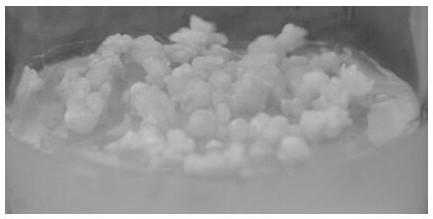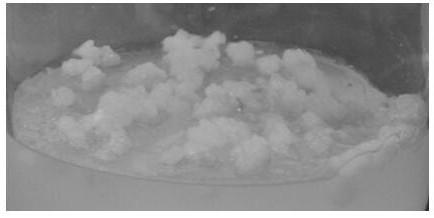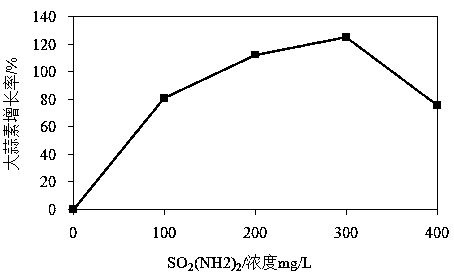Method for producing allicin by using allium sativum callus
A technology of callus and allicin, applied in the field of agricultural bioengineering, can solve the problems of many impurities in raw materials, can not fully meet market demand, low product purity, etc., and achieves strong controllability, no pesticide residue problem, and strong uniformity. Effect
- Summary
- Abstract
- Description
- Claims
- Application Information
AI Technical Summary
Problems solved by technology
Method used
Image
Examples
Embodiment 1
[0041] (1) Callus induction and subculture using garlic bulb slices as explants:
[0042] Pick garlic bulbs without lesions and peel off their skins, rinse them with tap water for 5 minutes, and then use 0.1% (w / w) HgCl in an ultra-clean workbench after ultraviolet sterilization. 2 Soak for 20 min, repeatedly wash with sterile distilled water for 2 min, then soak with 75% (w / w) ethanol for 10 min, then repeatedly wash with sterile distilled water for 2 min for later use; cut garlic bulbs into 0.5 cm thick garlic slices, inoculate into Callus induction medium: MS + 30g sucrose + 1.5mg / L 2,4-D + 0.5mg / L KT + 7.8g / L agar pH=5.8, until a sufficient amount of yellow or light yellow granular callus is induced After the organization, subculture was carried out for 3 times for later use;
[0043] (2) Culture of garlic callus high-yielding allicin cell line:
[0044] After the garlic callus was subcultured for 3 times, the vigorously growing garlic callus was selected and transferred...
Embodiment 2
[0048] (1) Callus induction and subculture using garlic bulb slices as explants:
[0049] Pick garlic bulbs without lesions and peel off their skins, rinse them with tap water for 5 minutes, and then use 0.1% (w / w) HgCl in an ultra-clean workbench after ultraviolet sterilization. 2 Soak for 20 min, repeatedly wash with sterile distilled water for 2 min, then soak with 75% (w / w) ethanol for 10 min, then repeatedly wash with sterile distilled water for 2 min for later use; cut garlic bulbs into 0.5 cm thick garlic slices, inoculate into Callus induction medium: MS + 30g sucrose + 1.5mg / L 2,4-D + 0.5mg / L KT + 7.8g / L agar pH=5.8, until a sufficient amount of yellow or light yellow granular callus is induced After the organization, subculture was carried out for 3 times for later use;
[0050] (2) Culture and metabolic regulation of high-yield allicin cell line from garlic callus:
[0051] After the garlic callus was subcultured for 3 times, the vigorously growing garlic callus w...
Embodiment 3
[0056] Comparative Test
[0057] Utilize the method of the present invention, without adding inducer SO 2 (NH 2 ) 2 The 1 / 2 MS culture medium was used as a control group, and a concentration of 300mg / L inducer SO was added 2 (NH 2 ) 2 The 1 / 2 MS medium of the control group was used as the control group, and the content of allicin was detected after the calli were cultured for 5, 10, 20, and 30 days respectively. 2 (NH 2 ) 2 After regulation, the allicin content was up to 89.43 μg / g (Table 1).
[0058] Table 1
[0059]
[0060] Conclusion: Compared with the control group, adding a concentration of 300mg / L inducer SO 2 (NH 2 ) 2 The content of allicin in the post-regulation group increased significantly, the highest was 89.43 μg / g, and the production capacity of allicin was significantly enhanced.
PUM
 Login to View More
Login to View More Abstract
Description
Claims
Application Information
 Login to View More
Login to View More - R&D
- Intellectual Property
- Life Sciences
- Materials
- Tech Scout
- Unparalleled Data Quality
- Higher Quality Content
- 60% Fewer Hallucinations
Browse by: Latest US Patents, China's latest patents, Technical Efficacy Thesaurus, Application Domain, Technology Topic, Popular Technical Reports.
© 2025 PatSnap. All rights reserved.Legal|Privacy policy|Modern Slavery Act Transparency Statement|Sitemap|About US| Contact US: help@patsnap.com



